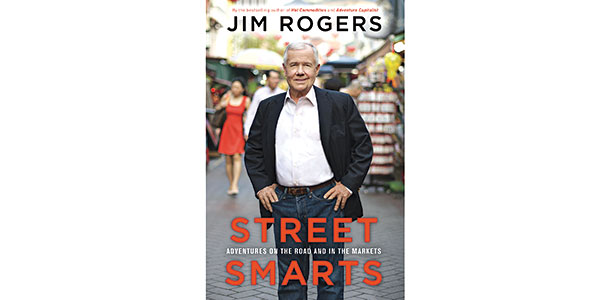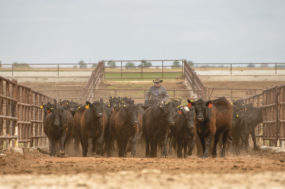Since then, he has taught finance at Columbia University, traveled the world and moved his family to Singapore, where he believes will be the next economic boom.
In his 2013 publication “Street Smarts,” Rogers emphasizes the importance of agriculture. Speaking with Progressive Cattleman’s Cassidy Woolsey, he offered some insight on the future of ag.
Q. You mention that finance is a thing of the past – if you want to get rich, study agriculture. Why do you tell college students to study agriculture?
A. ROGERS: In our history, there have been long periods where the financial types were in charge, followed by long periods where the people who produced real goods were in charge.
In the ’50s, ’60s, ’70s, people who produced real goods were more important than people on Wall Street and finance. In the last 30 years, finance has been the masters or the kings of the universe. In my view this is coming to an end, just as these cycles have always come to an end.
Due to the huge amount of competition in finance, the large amount of debt and the result of governments coming down hard on financial types, the cycle is about to change.
Contrast this with real goods for instance; in America the average age of a farmers is 58, Japan is 66, and Canada is the oldest recorded in history. Young people aren’t replacing farmers.
So it’s pretty simple stuff. The financial industry is going into a period of decline again – at least a relative decline. It is becoming harder to get a job in finance, and there are no farmers.
Either farming is going to become extremely profitable again or we aren’t going to have any food at any price. With very few people going into agriculture, something has to give.

Q. Where did this idea of investing in agriculture come about and why is it so important?
A. ROGERS: I have been investing for a few decades now. I am always looking for new things to invest in. Since my view of agriculture is that the industry will become more profitable, I would like to find things in agriculture to invest in.
The future is in agriculture; figure out what you love and do it in an area that will make you the most money, and that is in agriculture.
Q. Studies have shown that the population will double by the year 2050. If so, will farmers and ranchers have the resources and skills needed to meet the needs of these extra consumers?
A. ROGERS: Oh yes, as people start to see farmers are the ones driving Lamborghinis, people will gravitate toward agriculture. Also, innovation will take place.
People will come up with new ways to produce, and new products will be developed. When there is a lot of money in an area, there is a lot of talent attracted to that area.
I am sure there will be unbelievable new development in agriculture in the next 30 to 35 years. It has always happened that way and it will continue to happen that way.
Q. The average age of a farmer is 58 in the U.S. and 66 in Japan. What has happened to the industry and how do you think we can get the younger generations involved?
A. ROGERS: There is nothing you can do except make them want to do it. The government can give people incentives, but in my view, you don’t need them.
It will make people inclined to go into the field, but you’re not going to tell someone you must love farming. There are many people who will love farming, the outdoors, the opportunities and the excitement, but many more people will want to do it when the money is there.
Q. Some consumers base their food decisions off of sustainable practices, especially in the meat market. What do you think the future of the beef industry is?
A. ROGERS: Oh, I don’t know … What I do know is that the world has made huge progress in genetics, not just human genetics but in animal genetics as well.
I think there will be dramatic developments not just in the feeding but also in the medical care and the breeding and everything else, in all animals as we go forward. It has always worked that way.
Q. Do you think people will be led away from the beef industry because of sustainability concerns?
A. ROGERS: No, the world always adapts. I’m not the least bit worried that the world won’t survive and adapt; it always has.
About 100 years ago, the Sahara Desert was a farm area – cows, pigs, sheep, everything else. Over history, Mother Nature turned it into a big desert, but somehow mankind survived in Africa, Europe and the Middle East.
Yes, whatever happens, mankind will figure out ways to adapt and survive; at least, we always have. I have driven around the country many times, and I have seen countries that have disappeared and countries that have survived. The ones that survived were the ones that adapted as change took place.
Q. Farming and ranching requires huge expense. What advice would you have for people wanting to start in the agriculture business?
A. ROGERS: It is very expensive to get into agriculture, but it is very expensive to get into most things these days. Basically, do your dues, do your homework, save some capital – and if you’re good at it, people will find you and invest some money in your business.
Q. What advice do you have for cattle producers young and old?
A. ROGERS: Do what you love. The people that are the most successful are the people who are happiest in life and do what they love. They don’t go to work; instead, they wake up every morning and start having fun.
They don’t care if it is the weekend or not. So my own advice is do what you love, and if you love something about agriculture, pursue it. If you love other fields, pursue them where the farmers are – because that is where the money will be. ![]()
—This interview has been edited for grammar and brevity.







